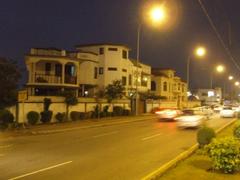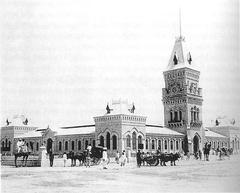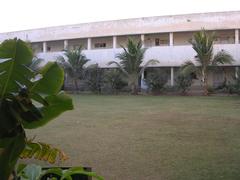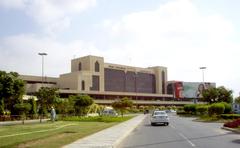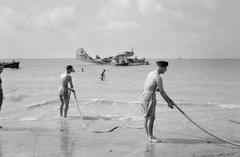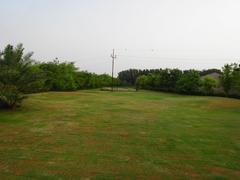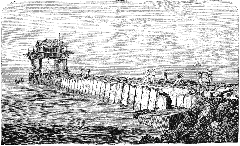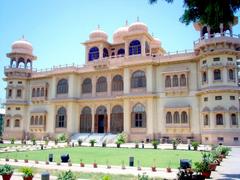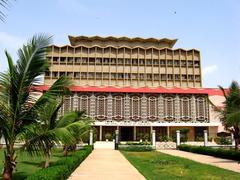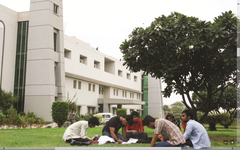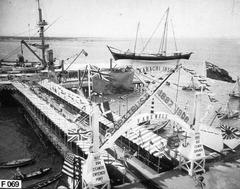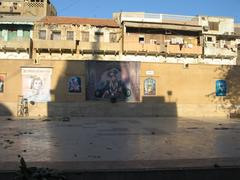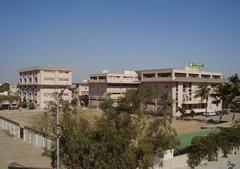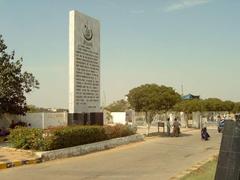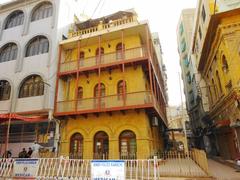TDF Ghar Karachi: Complete Guide to Visiting Hours, Tickets, and Historical Significance
Date: 04/07/2025
Introduction
TDF Ghar, located in Karachi’s historic Jamshed Quarters, stands as a premier heritage site and cultural hub, offering visitors an immersive experience into the city’s rich multicultural and colonial-era past. Meticulously restored by The Dawood Foundation (TDF), this early 20th-century house celebrates Karachi’s layered history through its preserved architecture, curated exhibitions, and vibrant community programming. Whether you are a history enthusiast, art lover, student, or traveler, TDF Ghar promises a unique journey through the stories and spaces that have shaped Karachi’s unique identity (Youlin Magazine, Graana, The Dawood Foundation).
Table of Contents
- Introduction
- Origins and Historical Context
- Architectural Features and Conservation
- The Dawood Foundation’s Restoration Initiative
- Visiting TDF Ghar: Hours, Tickets & Accessibility
- Visitor Experience: Amenities and Highlights
- Exhibitions and Educational Programs
- Facilities and Community Engagement
- Visitor Tips & FAQs
- Nearby Attractions and Travel Advice
- Visuals and Media Suggestions
- Conclusion & Call to Action
- Official Sources
Origins and Historical Context
TDF Ghar was originally built in the early 20th century, reflecting the diverse ownership patterns of Karachi’s then-emerging middle class. Initially owned by Mrs. Haribai Motiram and later by Hanifabai Haji Gani, the house is emblematic of the pluralistic society that characterized pre-partition Karachi (Youlin Magazine). Jamshed Quarters, named after Karachi’s first mayor, Jamshed Nusserwanji—a renowned Parsi philanthropist—was designed as a progressive middle-class neighborhood, home to Muslims, Hindus, Parsis, Christians, and Jews. The area played a pivotal role in Karachi’s urban and social development during the British colonial era.
Architectural Features and Conservation
Colonial-Era Design
TDF Ghar is a textbook example of early 20th-century Karachi architecture, boasting high ceilings, spacious rooms, and intricate handcrafted tilework. The façade is distinguished by its signature yellow tiles, while interiors feature original Burma teak woodwork, period mosaic tiles, and ornate balustrades (Qasasul Safar).
Interior Highlights
- Living Room Museum: Restored to its 1930s condition, this space features antique furniture, a gramophone, Remington typewriter, Anglo-Indian roll-top desk, and Parsi vanity table.
- Library: The first-floor library operates on a book-swapping model and regularly hosts literary events, offering over 2,500 volumes ranging from history to children’s literature (Graana).
- Sehan Café: The rear veranda café recalls Karachi’s Irani café culture, featuring vintage bentwood chairs and a relaxed ambiance.
Adaptive Reuse
Restored in 2016 and opened to the public in 2017, TDF Ghar exemplifies adaptive reuse, balancing the preservation of original architectural elements with the integration of modern amenities (Qasasul Safar). The project sets a benchmark for heritage conservation in Pakistan.
The Dawood Foundation’s Restoration Initiative
The restoration was spearheaded by The Dawood Foundation, Pakistan’s leading organization for science, education, and heritage projects. Their approach maintained the building’s historical integrity while adapting it for contemporary cultural use, ensuring inclusivity and accessibility (Youlin Magazine).
Visiting TDF Ghar: Hours, Tickets & Accessibility
- Hours: Open Tuesday to Sunday, 11:00 AM – 6:00 PM. Closed Mondays and public holidays.
- Tickets: Entry fee is PKR 50 per person (as of 2025), payable at the entrance. Special events may have separate charges.
- Guided Tours: Complimentary tours are available daily at 12:00 PM and 4:00 PM in English and Urdu; group tours require advance booking (TDF Official).
- Accessibility: The ground floor is wheelchair accessible with ramps and accessible restrooms. Due to the historic design, upper floors may be less accessible—contact in advance for arrangements.
Visitor Experience: Amenities and Highlights
- Rooftop Café: Enjoy panoramic views of Karachi’s old city, including the Mazar-e-Quaid and Denso Hall. The café serves local snacks and beverages, especially popular at sunset.
- Exhibitions & Workshops: Regularly hosts exhibitions, talks, and workshops on Karachi’s history, architecture, and culture (Graana).
- Interactive Spaces: The Living Room Museum and Numaish Halls provide engaging, hands-on experiences with heritage artifacts and multimedia installations.
- Library & Reading Room: Ideal for students and researchers; visitors may read onsite but not borrow books.
Exhibitions and Educational Programs
Permanent and Rotating Exhibitions
- From Borders to Belongings: An immersive 2025 exhibition exploring migration’s impact on Karachi’s identity through personal stories, artifacts, and multimedia (The Dawood Foundation).
- Permanent Heritage Displays: Showcasing original household items, photographs, and documents from the house’s past residents (Wikipedia, Rehlat).
Educational Programs
- Workshops: Cover topics such as heritage preservation, storytelling, and traditional crafts.
- School Programs: Guided tours and interactive sessions tailored for students; teachers can coordinate curriculum-based visits (The Dawood Foundation).
- Community Events: Includes book launches, film screenings, and collaborative exhibitions with other cultural organizations.
Facilities and Community Engagement
- Sehan Café: Modeled on Irani cafés, it offers a social space for refreshments and informal discussions (Rehlat).
- Numaish Halls: Versatile exhibition and event spaces available for rental to like-minded organizations.
- Wi-Fi and Connectivity: Free Wi-Fi throughout; strong mobile coverage.
- Gift Shop: Sells local handicrafts and TDF Ghar-branded merchandise; proceeds support heritage initiatives.
- Safety: On-site security and CCTV; bag checks at entry.
Visitor Tips & FAQs
Visitor Tips
- Allocate at least 2 hours to enjoy all facilities.
- Photography is allowed except where noted; drone use is prohibited.
- Modest attire is recommended.
- Check TDF Ghar’s official website and social media for the latest program and event updates.
Frequently Asked Questions
Q: What are TDF Ghar’s visiting hours?
A: Tuesday to Sunday, 11:00 AM – 6:00 PM; closed on Mondays.
Q: How much is the entry fee?
A: PKR 50 per person; special events may cost more.
Q: Are guided tours available?
A: Yes, complimentary tours at 12:00 PM and 4:00 PM; advance booking for groups is advised.
Q: Is TDF Ghar accessible for people with disabilities?
A: The ground floor is accessible with ramps and restrooms; upper floors may have limitations.
Q: Is photography permitted?
A: Yes, except in restricted areas.
Q: Is there a café?
A: Yes, the rooftop Sehan Café offers snacks and beverages.
Nearby Attractions and Travel Advice
TDF Ghar’s location in Jamshed Quarters makes it an ideal starting point for exploring:
- Denso Hall: Victorian library and reading room.
- Merewether Clock Tower: Iconic colonial structure.
- Empress Market: Bustling 19th-century bazaar.
- Mazar-e-Quaid: Mausoleum of Muhammad Ali Jinnah.
Walking tours are often offered by TDF Ghar and heritage groups. For food, nearby Burns Road and Bohri Bazaar are popular for street eats.
Getting There:
Accessible via car, taxi, Careem, Uber Pakistan, and public transport. Limited street parking; ride-hailing is recommended.
Visuals and Media Suggestions
For additional visual content, explore the official TDF Ghar website and social media.
Conclusion & Call to Action
TDF Ghar is more than a museum—it is a living cultural space connecting Karachi’s past to its present. Through adaptive reuse, engaging exhibitions, and inclusive programming, it stands as a beacon of heritage conservation and community engagement. Plan your visit, participate in an event, or simply enjoy a rooftop tea while soaking in Karachi’s urban landscape.
Plan your visit to TDF Ghar today!
Check the latest updates on the official website or download the Audiala app for curated cultural guides. Share your experience using #TdfGhar and help preserve Karachi’s vibrant heritage.
Official Sources and Further Reading
- Youlin Magazine: TDF Ghar—Reminiscing Cultural History of Karachi
- Graana: An Overview of TDF Ghar Karachi
- The Dawood Foundation: TDF Ghar
- TDF Official Website: Visiting Tdf Ghar
- Qasasul Safar: TDF Ghar Karachi Adaptive Reuse Project
- Rehlat: TDF Ghar Karachi Visitor Info
- Karachi Views: TDF Ghar Ticket Price & Facilities
- HamariWeb: TDF Ghar Directory
